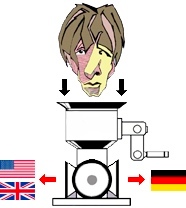| Pages in topic: < [1 2 3 4 5 6 7 8] > |
Off topic: Pronunciation that makes you cringe (inwardly) Thread poster: Cilian O'Tuama
|
|---|
Baran Keki 
Türkiye
Local time: 19:06
Member
English to Turkish
|
Cilian O'Tuama 
Germany
Local time: 17:06
German to English
+ ...
TOPIC STARTER | Thanks everyone for taking this so far and for sticking to the intended point 😊 | Dec 29, 2022 |
It would’ve been even more chaotic if I hadn’t tried to restrict it to one particular language.
I hope to choose my words more wisely next time.
| | | |
Tom in London
United Kingdom
Local time: 16:06
Member (2008)
Italian to English
Cilian O'Tuama wrote:
It would’ve been even more chaotic if I hadn’t tried to restrict it to one particular language.
I hope to choose my words more wisely next time.
Well, now that you've set the hare running...
| | | |
Tom in London
United Kingdom
Local time: 16:06
Member (2008)
Italian to English
Pronunciation that makes me cringe:
1. The Russian surname "Putin" pronounced in a way that rhymes with "Rootin' tootin'". Or that adds an "i" as in "Piutin".
2. "The" Ukraine.
[Edited at 2022-12-29 08:22 GMT]
| | |
|
|
|
Cilian O'Tuama 
Germany
Local time: 17:06
German to English
+ ...
TOPIC STARTER | Tom the hare | Dec 29, 2022 |
Tom in London wrote:
Well, now that you've set the hare running...
You might prefer to start your own thread. Which part of "English words" confused you? 
| | | |
Tom in London
United Kingdom
Local time: 16:06
Member (2008)
Italian to English
| No part of that | Dec 29, 2022 |
Cilian O'Tuama wrote:
Which part of "English words" confused you?
There is nothing about the phrase "English words" that confuses me.
| | | |
Tom in London
United Kingdom
Local time: 16:06
Member (2008)
Italian to English
| The constantly changing English language | Jan 1, 2023 |
It is now extremely common, in everyday (careless conversational) English pronunciation, to completely remove the letter "T" as in, example "habit", which is now commonly pronounced "habi'".
All words ending with the letter "t" have been replaced with that silent apostrophe.
This major change in everyday English has crept up on us unnoticed. There are no class distinctions; without exception, this changed pronunciation has been adopted by almost everyone including on t... See more It is now extremely common, in everyday (careless conversational) English pronunciation, to completely remove the letter "T" as in, example "habit", which is now commonly pronounced "habi'".
All words ending with the letter "t" have been replaced with that silent apostrophe.
This major change in everyday English has crept up on us unnoticed. There are no class distinctions; without exception, this changed pronunciation has been adopted by almost everyone including on the BBC (which for some time now, in any case, has no longer been the guardian of proper English)
EXAMPLES
It isn't the only one = I' isn' the only one
I wouldn't worry about it if I were you = I wouldn' worry about i' if I were you
Don't worry; I haven't forgotten = Don' worry; I haven' forgo''en.
And so on. Non-native English speakers beware! Please don't learn to pronounce English that way!
(Please don' learn to pronounce English tha' way)
[Edited at 2023-01-01 12:58 GMT]
[Edited at 2023-01-01 13:06 GMT] ▲ Collapse
| | | |
Kevin Fulton 
United States
Local time: 11:06
German to English
| Coup de grace | Jan 1, 2023 |
This is commonly mispronounced by many speakers of American and British English alike as "koo de gra" (coup de gras), which has an entirely different – if somewhat ridiculous – meaning in French.
[Edited at 2023-01-01 16:18 GMT]
| | |
|
|
|
Tom in London wrote:
2. "The" Ukraine.
I know it is not correct anymore. But somehow I tend to add a "the" before Ukraine just like the Gambia, the Netherlands and the Congo.
| | | |
Jan Truper 
Germany
Local time: 17:06
English to German
Tom in London wrote:
All words ending with the letter "t" have been replaced with that silent apostrophe.
This major change in everyday English has crept up on us unnoticed. There are no class distinctions;
I always thought this was some working class or regional thing -- years ago I was having breakfast with a nice English working class lad in a Greek restaurant in L.A., and when he ordered an omelette, he said:
It's be'a with Fe'a ("it's better with Feta")
| | | |
Lingua 5B 
Bosnia and Herzegovina
Local time: 17:06
Member (2009)
English to Croatian
+ ...
Jan Truper wrote:
Tom in London wrote:
All words ending with the letter "t" have been replaced with that silent apostrophe.
This major change in everyday English has crept up on us unnoticed. There are no class distinctions;
I always thought this was some working class or regional thing -- years ago I was having breakfast with a nice English working class lad in a Greek restaurant in L.A., and when he ordered an omelette, he said:
It's be'a with Fe'a ("it's better with Feta")
The Cockney accent is characterized by the letter 't' being pronounced with less intensity, or almost ignored altogether. This is called a glottal stop in phonetics. Therefore, words like “better” are pronounced more like “beh-uh.”
https://www.tandem.net/blog/introduction-to-english-accents
Otherwise, examples by Tom are completely fine in US English. Ending consonants are usually silent in US English. There are a lot of variations of silent or glottal T in US English (and it's perfectly correct).
| | | |
Tom in London
United Kingdom
Local time: 16:06
Member (2008)
Italian to English
| I knew someone would say that… | Jan 2, 2023 |
[quote]Lingua 5B wrote:
Jan Truper wrote:
The Cockney accent
… but it isn't cockney. It's everybody.
| | |
|
|
|
| Chaise lounge | Jan 2, 2023 |
I cringe every time I hear the transformation of “chaise longue” into “chaise lounge”…
| | | |
Tom in London
United Kingdom
Local time: 16:06
Member (2008)
Italian to English
I cringe every time I hear an English person saying "pop", in an effort to downplay the true significance of the situation, as in "I'm just going to pop this oxygen mask on you"
Also (this isn't about pronunciation) but it's another English thing that makes me cringe. Images of English people (especially in advertisements) holding a large mug, presumably filled with tea. I think you're meant to think that this makes them friendly and warm. I just find it embarrassing.
[Edit... See more I cringe every time I hear an English person saying "pop", in an effort to downplay the true significance of the situation, as in "I'm just going to pop this oxygen mask on you"
Also (this isn't about pronunciation) but it's another English thing that makes me cringe. Images of English people (especially in advertisements) holding a large mug, presumably filled with tea. I think you're meant to think that this makes them friendly and warm. I just find it embarrassing.
[Edited at 2023-01-02 10:45 GMT] ▲ Collapse
| | | |
Tom in London
United Kingdom
Local time: 16:06
Member (2008)
Italian to English
(not really pronunciation)
When people ask themselves a question and then answer the question themselves. What's the point?
As in this example, just seen on Twitter:
"Am I a dyed-in-the-wool, pro-democracy and consequently pro-Dem partisan who lets his hopes color his analysis? Probably"
(I suppose I should just be thankful that he didn't reply "likely").
| | | |
| Pages in topic: < [1 2 3 4 5 6 7 8] > |















